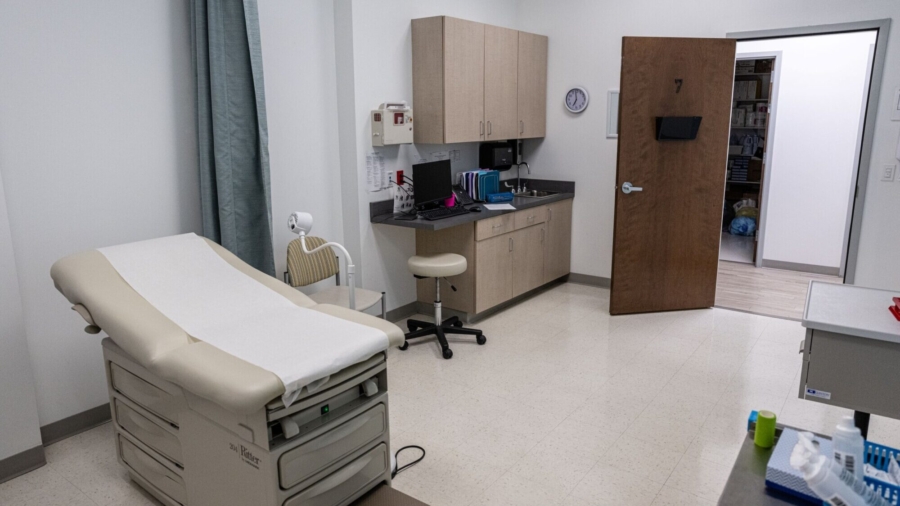The South Carolina Senate on Sept. 8 passed legislation to ban abortions after a fetal heartbeat is detected—at roughly around six weeks gestation—after the chamber failed to pass a near-total abortion ban with no exceptions for rape or incest.
In a special session called in the aftermath of the U.S. Supreme Court decision overturning Roe v. Wade, senators voted 27–16 late on Sept. 8 on a bill HB 5399 that would effectively amend a current fetal heartbeat abortion ban, also known as the Fetal Heartbeat Protection From Abortion Act, or Senate Bill 1.
SB 1, which bans abortions after a fetal heartbeat has been detected—at roughly around six weeks of gestation—was signed into law by Republican Gov. Henry McMaster in February 2021 but was later temporarily suspended by the state’s Supreme Court on Aug. 17 (pdf) following a challenge by abortion providers. The court is currently reviewing whether the law violates privacy rights.
In the meantime, a 2016 law is in effect which bans abortions 20 weeks after conception, except when the procedure is deemed necessary to protect the life of the mother, or if there is a fetal anomaly.
The bill HB 5399 passed in the state Senate on Sept. 8 would effectively tighten the abortion restrictions set out in the currently-blocked fetal heartbeat abortion ban. In addition to banning abortions after a fetal heartbeat has been detected, HB 5399 would also reduce the time that victims of rape and incest who become pregnant can seek an abortion: from 20 weeks in the existing law, to about 12 weeks.
Like the state’s current fetal heartbeat abortion ban, HB 5399 would allow an abortion if the unborn child receives a diagnosis of a fetal anomaly, but it would require diagnoses from two doctors, not one, as the blocked SB1 requires.
HB 5399 also requires that a DNA sample from the remains of the aborted unborn child be collected for police.
The bill now goes back to the South Carolina House, where lawmakers will consider whether to adopt the changes by the Senate.
Near-Total Abortion Ban Failed to Pass
The South Carolina House on Aug. 30 passed HB 5399 as an abortion ban from conception, with exceptions for rape and incest. House lawmakers had initially rejected a previous version of the bill without the exceptions.
The South Carolina Senate Medical Affairs Committee on Sept. 6 voted 9–8 to remove the exceptions for rape and incest from the bill—turning HB 5399 back to a near-total abortion ban—before sending it to the full chamber.
Senators in the special session failed to pass HB 5399 as a near-total abortion ban after five Republicans refused to support it. They were state Sens. Tom Davis, Greg Hembree, Katrina Shealy, Penry Gustafson, and Sandy Senn.
Davis had threatened to filibuster the bill, while the three women each said they couldn’t support the bill unless there were rape or incest exceptions. The five Republicans were joined by all Democrats in the Senate in opposing the near-total abortion ban.
Republicans control both the state House and Senate, but they are a few seats short of a two-thirds majority that would enable them to overcome any filibuster. Without the votes to end a filibuster launched by Davis, the South Carolina Senate’s Republican leader, Shane Massey, conceded that the near-total abortion ban would not be able to pass.
“We were never going to pass a total abortion ban,” he said. “We never had the votes to pass even what the House passed,” he added, referring to how the state’s Senate didn’t have enough support for a ban at conception.
McMaster’s spokesperson, Brian Symmes, said, “It is the governor’s hope that the House and Senate will soon come to an agreement and send a bill to his desk for signature.”
McMaster previously issued statements that support restricting abortion. He said in a statement on Twitter in January 2020, “South Carolina is a proudly pro-life state, and any pro-life legislation that makes it to my desk will be signed immediately.” He also said on Twitter in January 2018, “I believe that human life begins at conception.”
The Associated Press contributed to this report.
From The Epoch Times


